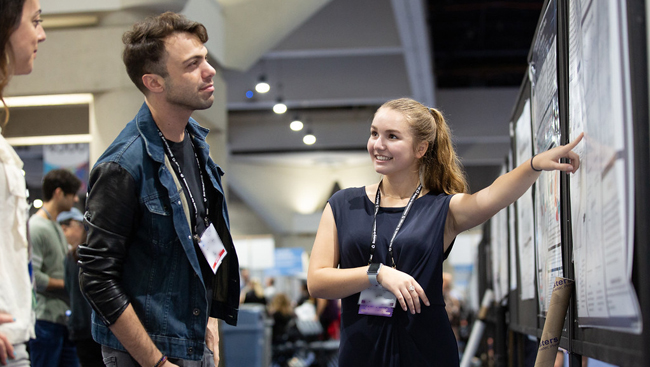Arianna Maffei is an associate professor at Stony Brook University, where she has led an independent research program since 2008. In this interview, she answers some of postdocs’ most common questions at the start of their careers, on topics including finding mentors, applying and interviewing for jobs, and starting a lab.
Click on each question to reveal her perspectives.
1. How can trainees connect with potential mentors?
If you’re looking for postdocs, go to posters at conferences, read papers, and send emails. Use every opportunity you have to network and be prepared. If you're trying to get somebody interested in having you in their lab, make sure you've read their papers and can start the conversation about a scientific topic with them.
When you reach out, have a rationale of why you're interested in their research. This doesn't mean proposing a project. It means looking at how your training so far could allow you to be a good fit for that environment and what you particularly like that’s coming out of the papers. Show enthusiasm for what you could bring and the type of interaction that you would like to build.
2. How should trainees strategize their postdoc if they feel they’re being pulled in different research directions?
Many students have interests in more than one field. If this is you, know that in a lot of institutions, you have the option of co-mentorship.
You may also have the option to do a postdoc in two labs at the same time, which is challenging because you’ll have two advisers and two labs. But if this is what you want, you should try it.
3. How soon should grad students start looking for postdocs?
Start thinking about applying about a year before you want your applications to be done. This allows you time to apply for a grant and to look at other opportunities. It also allows your future adviser time to look for funds to cover your salary.
4. How soon should postdocs start applying for academic jobs?
Job openings are typically advertised in the late summer or fall. The market is competitive, so applying before your papers are accepted for publication is risky and may put you at a disadvantage. Consider the possibility of applying for grant mechanisms that support the transition to independence. Overall, preparing to hit the job market takes about a year between preparing grant proposals and making sure papers are on their way to publication. In parallel, give yourself time to think about your research directions in the short-, medium-, and long-term. Begin writing your research statement a few months before job openings are advertised.
5. How should the CV differ for teaching and research positions?
If you want a teaching position, you need to have teaching credentials and demonstrate your ability to design a course and carry it out. You need knowledge about strategies for teaching in a classroom environment.
As you're doing your postdoc, look at pedagogy articles to learn about the current status of teaching. Ask your adviser if you can teach a couple of lectures to gain experience and learn how it feels to be in front of a class.
Also, think about what course you would teach and how you would develop it, and put this in your job application. This would be a substantial teaching statement, which is what institutions look for.
On the other hand, if you’re looking for a research position, the strategy for building a CV is to put your research front and center. That has more to do with showcasing your scientific background.
As early as possible, think about what you're interested in and how you would go about researching them when you become independent.
6. How can job applicants improve their chances of being offered an interview?
Search committees first look at your CV — your publications, training record, and productivity. For example, it’s difficult to be considered productive when publishing one paper in five or six years.
After productivity is the coherence of your research statement. You don’t need to have a fixed narrative — to have known this is what you wanted to do since you were a kid. It’s rare that someone has that.
Looking backward, however, finding your narrative isn’t difficult, because there's a thread. Usually, the choices you’ve made during your career were motivated by interest (or loss of interest) in specific aspects of the studies you carried out. Those shifts are easy to rationalize if you take some time to think about them.
Doing this gives your narrative a sense of maturity that shows how you made choices based on ideas and personal growth. These come across and will help you be selected for a shortlist.
7. How important is having a grant?
It makes life easier if somebody has a grant, but it’s not necessary to have one. It’s more important to have clear ideas about what to put in a grant proposal. So, apply for grants if you’re in the process of applying for faculty positions, but more so that you learn how to write a grant. That’s important. Even if you don’t get the grant, you’ll still be seen as a competitive applicant by a search committee.
8. What advice do you have for successful job interviews?
Don’t worry too much about making mistakes. If you do multiple interviews, even for postdoc positions, they won't be perfect. You're going to go to interviews for postdocs that will go well and others that may go less well than you hoped. You’ll make new mistakes. The important takeaway is to learn from your mistakes so that you don’t repeat them in the next interview.
Sometimes, an interview doesn't go badly, but there's not a good connection between you and the interviewer. This is information — it's not a good match. To be successful in a postdoc or faculty position, you have to have a match on both sides.
9. What can candidates do to prepare for the chalk talk?
Your goal is to be able to outline your vision for the next five years and the longer-term vision for your research program, which is something you should have already put in your research statement. It’s an informal talk, so people will ask questions in the middle, and probably probing ones at that, such as, “Why do you think it's interesting?”, “Why are you not going in an opposite direction?”, or “Why this technique and not another?” You have to be flexible and think on your feet.
My advice, however, is to practice your chalk talk. Practicing writing down your aims or drawing diagrams is useful for leading the audience during the talk, and it simplifies your thinking.
Keep in mind you have time to write on a board before the chalk talk begins. If there are some main points you want on the board throughout the presentation, put them up in advance. This saves time, sets the pace, and allows you to show the audience how a specific set of experiments will address certain aspects of the diagram. It keeps bringing the audience back to the main question as well, which is the one thing that’s easy to lose in a chalk talk.
You want to be open during a chalk talk. You have to assume the people listening will be your colleagues, that they’ll want you to be successful, and want to be part of your research. You can find new collaborators down the line because they're interested in what you're proposing and willing to support you.
10. What should candidates know about the negotiation process?
Negotiation comes when there's an offer, not before, and different departments can go about it in different ways. Usually, the chair of the department will ask for a list of equipment and personnel. This comes out of your asking budget, so the more detail you can give, the better. For example, someone may say, "I can't give you this amount, but I can add this piece of equipment that we have available and can give to you.” Everybody will have a different style, and opportunities come up if you ask questions nicely.
11. Say someone has accepted a faculty position and is starting his or her own lab. What advice do you have for differentiating your research from your adviser’s?
One issue a lot of people have in mind — and I did, too — when moving to a faculty position is how to take on a research project when your postdoc adviser may still be interested in it.
I had a supportive adviser who's still supportive now, so we openly talked about this circumstance. We had a conversation about what aspects of our project we could divide and in what way. She was interested in it as well because there was good research to do. It was new line of investigation, and there were many different directions that one could have taken.
I find that at the beginning, when you leave the lab, your thinking and your adviser’s thinking are similar, because you've been working together for years. It turns out, though, that soon after you start your lab, because of the interaction with the people who join your lab, your ideas will diverge.
You may worry at first that you won’t be efficient enough on your own, but rather than worrying about going quickly, allow your ideas to take you in a different direction. It will happen quickly whether you want it to or not, and it might even take you in a much more fun direction than you had anticipated. With a bit of effort, you can find a direction that is new, original, and appealing to you.
Speaker
Arianna Maffei, PhD
Arianna Maffei is an associate professor in the department of neurobiology and behavior at SUNY Stony Brook. She received her PhD in physiology from the University of Pavia, in Italy, and was a postdoctoral scholar at Brandeis University. Her lab studies how experience and learning modify the connectivity and excitability of neuronal circuits and how these changes affect behavior.




.png?h=1763&w=3125&la=en&hash=B2439C2768576BED6405672E5CD5CF8CB1AA375F)




